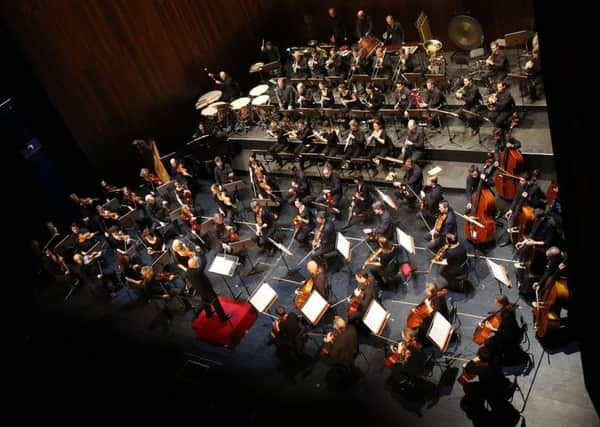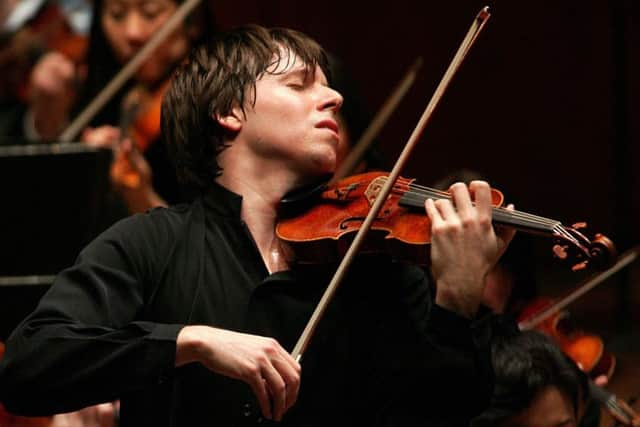Music preview: The Sunday Classics series at the Usher Hall


The Usher Hall is such a well-established part of Edinburgh’s cultural fabric that it’s easy to take it for granted. Quaint old customs like the interval bell – the heavy duty hand-held sort, rung with vigour each concert night by the front-of-house duty manager – may seem endearingly old-fashioned. Yet Edinburgh’s grand old musical lady is very much part of the contemporary classical music circuit; indeed, it is one of the few UK concert halls to promote a full scale series of performances by international orchestras.
“I’m told we have the biggest international season outside London,” says Karl Chapman, whose previous role as general manager of the Usher Hall, has now been broadened to include control of Edinburgh’s Assembly Halls, Churchill Theatre and Ross Bandstand. This year’s Sunday Classics afternoon series, which opens early next month with the Basel Symphony Orchestra and dazzling cellist Sol Gabetta, will welcome ten great orchestras from all around Europe, together with a dream team of soloists.
Advertisement
Hide AdAdvertisement
Hide AdThat’s a far cry from the days when Glasgow’s newer Royal Concert Hall was the sole visiting venue for the big international orchestras. This season they don’t appear to have any, while Edinburgh is leading the way. “Since Glasgow stopped, we’ve been getting more and more concertgoers from the west,” says Chapman. “It’s a fact that venues around the UK have been hit by cuts. Here in Edinburgh we’ve had our challenges, but the city council is happy with what we do, and the proof of that is in the high calibre programme we’ve been able to put together this season.”


Big names are not hard to find in this year’s programme. Chapman is particularly proud he has wooed such a hot handful of violin virtuosi: Joshua Bell (performing with the Academy of St Martin in the Fields), Maxim Vengerov (with the newly-formed Würth Symphony Orchestra) and Nikolaj Znaider (with the Brussels Philharmonic).
Having the money to make it happen is one thing, but there’s so much more to managing an orchestra visit than simply writing a sizeable cheque. It takes a good 18 months of wheeling and dealing for Chapman and his team to approach, book and finally position a 90-strong foreign orchestra on the Usher Hall stage.
Apart from the challenges of transportation and accommodation, there are programmes to be discussed. “What a Russian orchestra might want to do, for instance, may not suit our particular audience needs. We have to look at what is being scheduled by the RSNO and SCO in their seasons, what the other visiting orchestras are planning to do, and try to avoid clashes of repertoire.” Even then, says Chapman, “wires can potentially get crossed and detailed negotiations have to take place.”
But dealing with the unexpected is second nature to the Usher Hall. “During the Edinburgh Festival, we can be coping in any one day with two or three orchestras. The challenge is one of simple arithmetic. Where you have a rock band, you’re looking after maybe five musicians. With one orchestra alone you could be dealing with 90 people, all of whom expect their home comforts. Problems multiply exponentially.”


Chapman has been long enough in the business to know how best to deal with most situations. “It’s often very basic things that upset visiting musicians, like when the wi-fi’s down. Make sure they have wi-fi and light refreshments, and they’ll be happy. The trick is to keep a professional head. I’ve been in this business 25 years, and recognise the reasons why musicians get upset. They are away from home and in a pressurised environment. I always try to put myself in their shoes.”
So what idiosyncratic behaviour can we expect from some of this season’s visitors? “Russian musicians tend to be heavy smokers, so at break time the lane outside the stage door gets enveloped in a nicotine haze,” says Chapman, effectively issuing a government health warning for the Russian State Philharmonic and St Petersburg Symphony Orchestra visits.
Advertisement
Hide AdAdvertisement
Hide AdHe’s also used to the “globalised” habits of those conductors who operate across multiple borders. “Ivor Bolton [who conducts the opening Basel Symphony Orchestra concert, but who also holds key conducting posts in other European cities] has four different phone numbers, one for each language he’s required to do business in.”
One thing many of these orchestral players and conductors seem to have in common is an instant love for the Usher Hall. “The feedback we get is genuine; they all just love the architecture and acoustic of this grand old venue,” says Chapman.
But don’t be fooled by the illusion of calm that audiences witness when these artists glide onto the stage and deliver impeccable performances. “It’s the old swimming swan analogy,” Chapman says. “The audience sit back and marvel at the surface grace of the swan. But behind the scenes, it’s a hive of industry as Usher Hall staff get ready to move pianos, heave instrument cases about, or prepare to alter the staging.”
That’s showbiz: it’s always the stars that get the applause.
Series highlights
29 October: Veteran British pianist Peter Donohoe joins the St Petersburg Symphony Orchestra in a heavyweight Russian programme that includes Rachmaninov’s Piano Concerto No 4.
12 November: A welcome return to Scotland by former RSNO music director Stéphane Denève, conducting the Brussels Philharmonic in Ravel’s Daphnis et Chloe Suite No 2, and Bruch’s Violin Concero with soloist Nikolai Znaider
21 January: The amazing Joshua Bell performs and directs Vivaldi’s Four Seasons with the Academy of St Martin in the Fields.
Advertisement
Hide AdAdvertisement
Hide Ad22 April: Pavel Kolesnikov is one of the most exciting young pianists to have come out of Russia in recent years. He performs Beethoven’s Fourth Piano Concerto with the Czech National Symphony Orchestra.
29 April: The Bruckner Orchester Linz, joined by the Leeds and Sheffield Philharmonic Choruses and soprano Brigitte Geller, create an epic presence in the series with Mahler’s gargantuan “Resurrection” Symphony.
For tickets and more information, visit ww.usherhall.co.uk